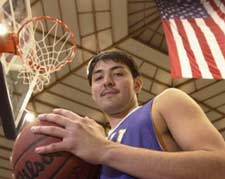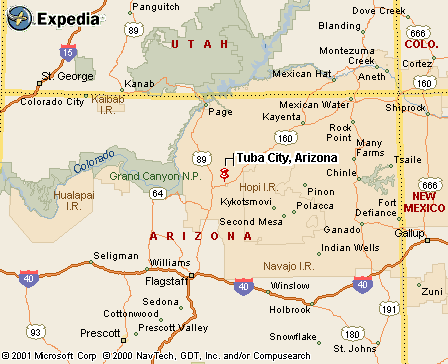|
|
Canku Ota |
|
|
(Many Paths) |
||
|
An Online Newsletter Celebrating Native America |
||
|
January 12, 2002 - Issue 53 |
||
|
|
||
|
Air Force-NAU Matchup 'a Bench Mark' for Navajo Players |
||
|
by Mark Shaffer The
Arizona Republic - January 2, 2002
|
||
|
credits: Mark Henle/The
Arizona Republic
Sophomore forward Kodiak Yazzie, a member of the Navajo Nation, leads NAU in steals this season |
|
But all that fervor and success have seldom translated into players for Division I-A basketball programs. So tonight's 7:05 tip-off at Walkup Skydome between Northern Arizona University (7-4) and the Air Force Academy (5-6) has more than a little significance for the nation's largest Native American tribe. It marks the first time that two tribal members, Air Force's Lamoni Yazzie and NAU's Kodiak Yazzie, with prominent roles on their teams have gone head to head in a major-college game. "This is a bench mark," said Albert Jim of Tohatchi, N.M., a longtime basketball coach on the reservation. "I hope it will go a long ways toward correcting the stereotypes that many college coaches have of 'they can't stay away from the res(ervation)' and all of the social problems." The Yazzies, who are related by clans, have done their part in changing that perception this season. Senior guard Lamoni Yazzie, who attended Tuba City Grey Hills High School, leads the Air Force in scoring with more than 13 points a game. He was named team captain before the season, the first Navajo so honored at a Division IA university. Sophomore forward Kodiak Yazzie, from Flagstaff Coconino High, is one of NAU's defensive leaders, leads the team in steals and averages nearly eight points a game. He hit the game-winning shot at the buzzer in NAU's 78-77 double-overtime win at Colgate in November. Lamoni Yazzie, a member of the Bitter Water Clan, says he spent many days herding sheep and cattle on his family's traditional land in the western part of the reservation, near the Grand Canyon. Kodiak Yazzie, a member of the Salt Clan, said he often found himself at the knee of his grandparents, listening to ancient stories, in the southwestern part of the reservation, north of Winslow. "These two clans are close cousins," says Larry Kee Yazzie, Lamoni Yazzie's father and a Tuba City attorney. And the basketball talent runs deep. Lamoni's brother, Lawrence, played three years at Air Force; Kodiak's cousin, Edison Bahe, is generally regarded as the best big man ever from the reservation. He starred at Coconino High in the late 1980s before playing at Yavapai College. Both Larry Kee Yazzie and Jim say the matchup comes at a particularly good time, after what they viewed as a negative portrayal of Native American athletes on the front page of the New York Times last summer. Citing NCAA statistics that indicated that just four-tenths of 1 percent of the total athletic scholarships awarded by major colleges went to Native Americans, the Times listed a host of reasons, including prejudice by outside coaches, homesickness on the part of the athletes, alcoholism and Native American cultures that suppress individual achievement. But Jim said the Navajo Nation has had success stories recently, aside from the Yazzies, on the major-college level, breaking a "very long dry spell" since brothers Willard and Ray Tsingine of Tuba City played in the same backcourt at NAU in the mid-1970s. Jarvis Mullahon, a guard Jim coached in the mid-1990s, started for two seasons at Texas-El Paso. Two other Navajo players, Vegas Davis and Bobby Manheimer, have been backup guards in recent years at Tennessee and Lamar, respectively. Another Navajo player, Brian Holliday, lettered for NAU last season. Jim said that a number of major universities recruited Mullahon until they found out his racial background. "The first question they asked was if he was Native American. Then, the second question they asked is if he was full-blooded Native American," Jim said. "Quite a few of them backed out after I told them yes to both questions." Jim said he has seen a major improvement in "res" basketball in recent years and more college prospects. Part of that is because of more exposure to the outside world and playing before large crowds at state tournaments in Phoenix and Albuquerque. Tuba City has won the past two Class 3A championships. Another is the cult of personality that follows standout Navajo basketball players, Kodiak Yazzie says. "I remember one time when we played at Chinle and I threw down a couple of dunks. After the game, there were all these little kids asking me to sign autographs," he said. NAU coach Mike Adras also said he has seen the improvement in his 10 years in Flagstaff and points to Kodiak Yazzie, who he says is "one of the most cerebral players I have coached in analyzing defensive situations." "There's such a passion for the game on the reservation. You see a lot of 4-year-olds already dribbling basketballs, and they grow up really knowing where that three-point line is," Adras said. "On top of that, they play year-round and have good backing of school administrators in going to team camps around the state. When you spend a lot of time on something, the skills will develop."
|
|
|
||
|
|
||
| Canku Ota is a free Newsletter celebrating Native America, its traditions and accomplishments . We do not provide subscriber or visitor names to anyone. Some articles presented in Canku Ota may contain copyright material. We have received appropriate permissions for republishing any articles. Material appearing here is distributed without profit or monetary gain to those who have expressed an interest. This is in accordance with Title 17 U.S.C. section 107. | ||
|
Canku Ota is a copyright © 2000, 2001, 2002 of Vicki Lockard and Paul Barry. |
||
|
|
|
|
|
The "Canku Ota - A Newsletter Celebrating Native America" web site and its design is the |
||
|
Copyright © 1999, 2000, 2001, 2002 of Paul C. Barry. |
||
|
All Rights Reserved. |
||

 FLAGSTAFF
- The Navajo Nation's basketball-crazy fans routinely pack its field
houses with upward of 5,000 fans. Its teams have dominated basketball
among the midsize Arizona high schools in recent years.
FLAGSTAFF
- The Navajo Nation's basketball-crazy fans routinely pack its field
houses with upward of 5,000 fans. Its teams have dominated basketball
among the midsize Arizona high schools in recent years.